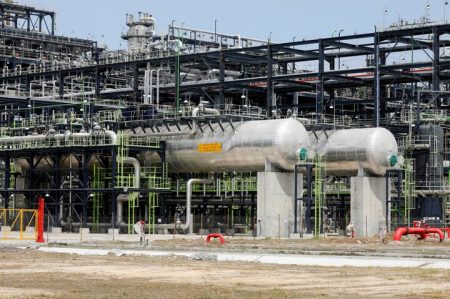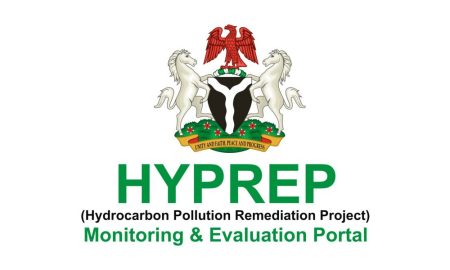
Markson Ibibo
Port Harcourt — A loud cheer erupted in Abuja on March 22, 2019 as the chief executives of two key organisations – Nigerian Content Monitoring and Development Board, NCDMB, and Nigerian Liquefied Natural Gas, NLNG, signed an agreement that will deliver status-changing benefits for Nigeria as a key exporter of liquefied natural gas and Nigerian companies and community people. For obvious reasons, the cheer reverberated in Bonny, Rivers State, the operating base of NLNG because the agreement sets out how Nigerian companies can contribute meaningfully to the implementation of the 7th train of the complex. Simbi Wabote, civil engineer and the Executive Secretary of the NCDMB, and Tony Attah, mechanical engineer and Managing Director of NLNG, must have felt relieved and good that months of careful planning and sometimes contentious deliberations ended in a handshake, just as the army of youths and fledgling Nigerian companies now expect the two men to walk through the halls of history and ensure the cheer doesn’t peter out with the ceremony in the federal capital.
The cheer that welcomed the signing of the Nigerian Content Plan for the implementation of NLNG Train 7 is justified for several reasons. First, the reality of Train 7 ends years of uncertainty which dogged the project since it was conceived in 2007. To give you an idea of the lapse in time, a child born in 2007 should be in secondary school now. Second, the Nigerian content plan for a huge project such as Train 7 demonstrates that Nigerian content development is now embedded in project execution in the country. Third, the Nigerian content plan was delivered within a record 90 days. But why all the hullabaloo about this? Previously, it would have taken anywhere between nine months to one year to deliver this plan, but things changed when the NCDMB and NLNG signed a Service Level Agreement (SLA) in May 2017, committing themselves to timely approvals of documents and compliance with the Nigerian Content Act. The agreement, the first of its kind between a regulator and operator in the oil and gas industry was adopted “as the template for managing documentation, contracting and expatriate quota and local operating companies.” It is reassuring that the two organisations will build on the success of the SLA and work towards the issuing of tenders in Quarter 3 of 2019.
Still, the most enduring significance of the Nigerian Content Plan for Tran 7 are the real benefits it will deliver to the country and her people. The Train 7 project is expected to expand NLNG’s production capacity by 35 percent from 22 Million Tonnes Per Annum (MTPA) to 30 MTPA. This will be good news for a country that exported its first LNG cargo from Bonny on October 9, 1999, and is currently the world’s 7th biggest exporter of LNG. With Train 7, Nigeria will move up to the number three spot. At peak construction, the Train 7 project is projected to provide direct and indirect employment for over 10,000 people.
Among other things, Train 7 will result in in-country fabrication of key components, civil works including construction of roads, piling and jetties and also provide opportunities for logistics, equipment leasing, insurance, hotels, office supplies, aviation, and haulage. No doubt, Nigerian companies will improve their expertise and experience as they provide goods and services for the project. The cost of Train 7 is not chicken feed. The net cost of the project is estimated at $4bn to $5 billion with a similar additional spend at NLNG’s base in Bonny, Rivers State. Development of feed gas will cost around $5 to $6 billion, which brings the composite value of Train 7 to some $12 billion.
There was a good basis for optimism at the signing ceremony on the future of Nigerian content development with regard to other projects. Already, the Egina deep-water project by Total has inspired the development of an integration facility in Lagos for a Floating, Production, Storage, and Offloading (FPSO) vessel. For Engr. Wabote, the signing of the latest Nigerian Content Plan marks an enduring landmark of his tenure which began in November 2016, when he assumed office in Yenagoa as the third substantive Executive Secretary of NCDMB. An oil and gas industry veteran and a solid son of the soil, Engr. Wabote has embarked on a quiet revolution with the encouragement and backing of a nine-member Governing Council headed by the Minister of State for Petroleum, Dr. Ibe Kachikwu.
Engr. Wabote said at the signing ceremony: “NCDMB envisions to be “a catalyst for the industrialisation of the Nigerian oil and gas industry and its linkage sectors,” and one of my key aims on assumption of office was to loosen up the process of doing business with us. So when we introduced the concept of service level agreements as one of the tools to shorten the long tendering and contracting timelines, NLNG was the first to embrace the idea. Today, NLNG holds the title as the first operator to sign this kind of agreement with NCDMB, and the Nigerian content plan which was agreed in a record time attests to the results of a genuine collaboration between a regulator and operating companies.”
Echoing similar sentiments, Engr. Attah said: “Nigeria LNG has stayed on course with this aspiration to develop and harness local businesses, talents, and potentials since we commenced operations 20 years ago. We have maintained a deliberate focus on Nigerian Content development in all aspects of our operations, long before the enactment of the Nigerian Content Act of 2010.
Our early quick wins were the capacity development initiatives for indigenous companies that provided services and materials for our plant construction and maintenance.”
As we look forward to the implementation of the Nigerian Content Plan for NLNG Train 7, it is important that host communities maintain peace, law, and order, without which all these will be a pipe dream. People who say they are angry or disappointed and so destroy our collective heritage are not fighting for development. They are simply anarchists. Maintenance of law and order by communities and reduction of the contracting cycle and thereby cost of projects, as exemplified by the new work ethic of NCDMB will help to encourage the shareholders – Nigerian National Petroleum Corporation (NNPC), Shell, Total and ENI) – as they aim to take the Final Investment Decision (FID) for NLNG Train 7 before the end of Quarter 4 this year. The cheer then will even be louder.



